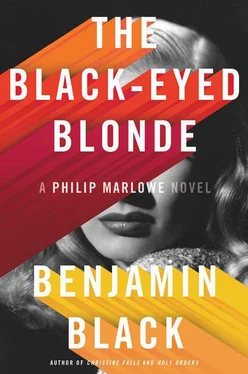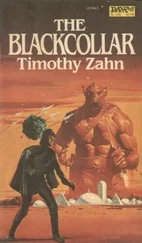“Where did you meet?”
“I told you — the Cahuilla Club. Then I saw him again, a few weeks later, in Acapulco. That was when”—again that faint rush of blood to her cheeks—“well, you know.”
I didn’t know, but I could guess. “Why Acapulco?”
“Why not? It’s one of those places one goes to. Nico’s kind of place.”
“Not yours?”
She shrugged. “Few places are my kind of place, Mr. Marlowe. I bore easily.”
“Still, one goes there.” I tried to keep the sourness out of my voice but didn’t succeed.
“You mustn’t despise me, you know,” she said, trying to make it sound playful.
For a moment I felt slightly woozy, like you do when you’re young and a girl says something that makes you think she’s interested in you. I pictured her down there in Mexico, on the beach, in a one-piece bathing suit, reclining in a deck chair under an umbrella with a book, and Peterson walking by and stopping, pretending to be surprised to see her, and offering to fetch her something tall and cool from the fellow in the sombrero selling drinks from a shack under the palms up behind the beach. And at that moment, as we stepped out on the far side of the trees, as if my thoughts had conjured it, there was the ocean, with long, lazy waves rolling in, and the sandpipers scurrying, and a smokestack off on the horizon trailing behind it a motionless plume of white vapor. Clare Cavendish sighed and, seeming hardly aware that she was doing it, linked her arm in mine. “Oh, Lord,” she said, with a sudden fervent throb in her voice, “how I love it here.”
We had come out of the trees, onto the beach. The sand was close-packed, and walking on it was not difficult. I knew how out of place I must look, in my dark suit and hat. Clare made me stop and held on to my forearm with one hand as she leaned down to take off her shoes. I thought about what would happen if she was to lose her balance and fall against me, so that I had to catch her in the crook of my arm. It was the kind of fool thought that would come into a man’s head on such occasions. We walked on. She linked her arm through mine again. She was carrying her shoes in her other hand, dangling from the tips of two fingers. There should have been music, a big whoosh of soupy violins, and some guy with a vowel at the end of his name crooning about the sea and the sand and the summer wind and you …
“Who was it that told you about me?” I asked. I wasn’t really all that interested, but I wanted to talk about something besides Nico Peterson for a while.
“A friend.”
“Yes, you said — but what friend?”
She bit her lip again. “Someone you know quite well, actually.”
“Oh?”
“Linda Loring.”
That came like a smack in the chops. “You know Linda Loring?” I asked, trying not to sound too surprised — trying not to sound anything. “How?”
“Oh, from here and there. Ours is a very small world, Mr. Marlowe.”
“You mean the world of the rich?”
Was she blushing again? She was. “Yes,” she said, “I suppose that is what I mean.” She paused. “I can’t help it that I have some money, you know.”
“It’s not my business to blame anyone for anything,” I said, too quickly.
She smiled and looked sideways into my eyes. “I thought that’s precisely what your business was,” she said.
My mind was still on Linda Loring. A butterfly the size of a chicken was flapping its wings somewhere in the region of my diaphragm. “I thought Linda was in Paris,” I said.
“She is. I spoke to her on the telephone. We call each other now and then.”
“To check up on the latest gossip among the international set, I suppose.”
She smiled and squeezed my arm against her side reprovingly. “Something like that.”
We came to a sort of lean-to, like a bus shelter, standing at the edge of the soft sand where the beach met the low dunes. Inside it there was a bench made from a few roughly cut planks, well weathered by the salt wind. “Let’s sit for a moment,” Clare said.
It was pleasant there, in the shade, with a nice breeze coming up from the water. “This must be a private beach,” I said.
“Yes, it is. How did you know?”
I knew because if it had been public, a shelter like this would have been so fouled and littered we wouldn’t have dreamed of sitting in it. Clare Cavendish, I told myself, was one of those people the world shields from its own awfulness.
“So you told Linda about Nico disappearing and then suddenly resurrecting himself, right?” I said.
“I didn’t tell her as much as I’ve told you.”
“You haven’t told me very much.”
“I’ve admitted to you that Nico and I were lovers.”
“You think a girl like Linda wouldn’t have guessed that? Come on, Mrs. Cavendish.”
“I wish you’d call me Clare.”
“Sorry, but I don’t think I can do that.”
“Why not?”
I disengaged my arm from hers and stood up. “Because you’re my client, Mrs. Cavendish. All this”—I waved a hand to take in the shelter, the beach, those busy little birds down at the water’s edge where the pebbles hissed in the wash as if they were on the boil—“all this is very nice, and pretty, and friendly. But the fact is, you came to me with some story about your boyfriend disappearing and you being anxious to trace him, poor thing though he was. Then it turns out Mr. Peterson had done the biggest disappearing trick of all, which you, for whatever reasons of your own, failed to tell me about. Then you introduce me to your husband and indicate how unhappy he makes you—”
“I—”
“Let me finish, Mrs. Cavendish, then you can have your say. I come to your lovely home—”
“I didn’t invite you here. You could have phoned and asked me to call in to your office again.”
“That’s true, that’s very true. But here I came, the bearer of bad news, news that would be a shock to you, as I thought, only to discover that you already knew what I had to say. Then you take me for a pleasant stroll in your delightful garden, you link your arm in mine and lead me onto your private beach and tell me you know my friend Mrs. Loring, who recommended my services to you after you didn’t tell her why you needed them—”
“I did tell her!”
“You half told her.” She tried to speak again, but I held a hand in front of her face. She was gripping the seat at both sides and looking up at me with an expression of desperation I didn’t know whether to believe in or not. “Anyway,” I said, feeling tired suddenly, “none of that matters. What matters is, what exactly do you want from me? What is it you think I can do for you — and why do you feel you have to pretend to be on the verge of falling in love with me to get me to do it? I’m for hire, Mrs. Cavendish. You come to my office, you tell me your troubles, you pay me some money, I go out and try to solve your problem — that’s how it works. It’s not complicated. It’s not Gone with the Wind —you’re not Scarlett O’Hara and I’m not what’s-his-name Butler.”
“Rhett,” she said.
“What?”
She had lost her stricken look and had turned her eyes away from mine and was gazing down the beach, toward the waves. She had a way of batting things aside, things she didn’t like or didn’t want to deal with, that always left me hanging. It’s the kind of knack that only a lifetime soaked in money can teach you. “Rhett Butler is the character you mean,” she said. “It’s also, by coincidence, my brother’s pet name.”
“You mean Everett the Third?”
She nodded. “Yes,” she said, “we call him Rett — without the h .” She smiled to herself. “I can’t imagine anyone less like Clark Gable.” Now she looked at me again, with a puzzled frown. “How do you know him?” she asked. “How do you know Everett?”
Читать дальше












